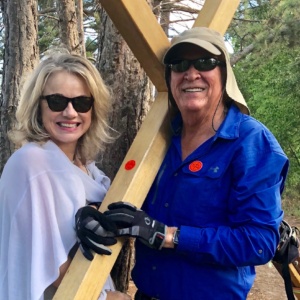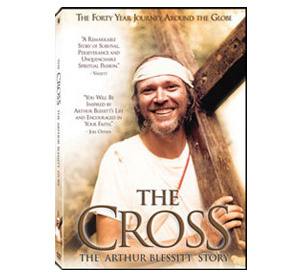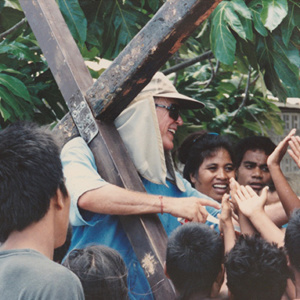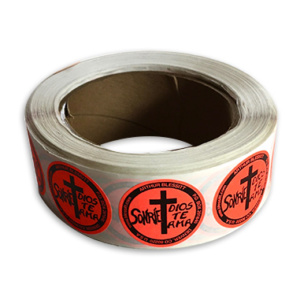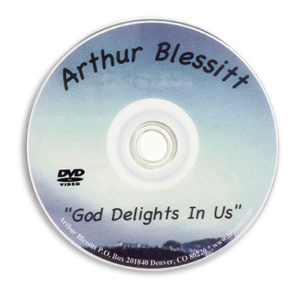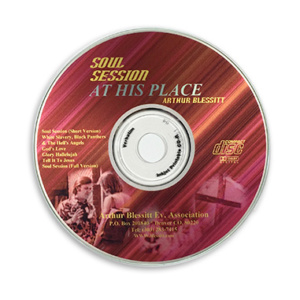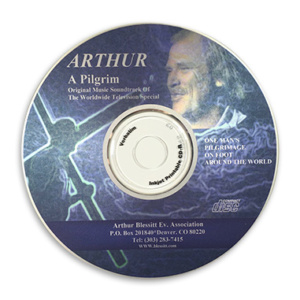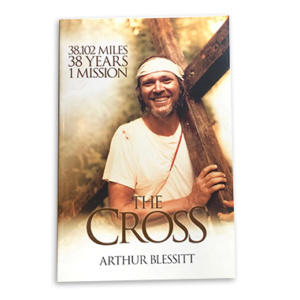AT THE CROSS
Through the anguish that had all but engulfed me while I listened to Judge Wolf’s portentous verdict, a vision appeared before my eyes, clear as a full moon.
The inspiring words of Genesis 15:1 rushed to my mind: “After these things the words of the Lord came to Abram in a vision, saying, Fear not, Abram: I am thy shield, and thy exceedingly great reward.”
Visions may be unfashionable and suspect in the nuclear age, but there it was nevertheless: without doubt a revelation from Christ.
I didn’t see Him in the courtroom, though I felt His presence. Jesus would not absent Himself from a trial in which He had been found guilty!
The vision He inspired was not an abstraction; it was practical as a safety pin and detailed as a snowflake.
Strong and insistent, its main elements were: a cross, a chain, a lock, a telephone pole, and myself sitting in the midst of the Boulevard, praying and witnessing, until someone rented me a building or until He returned!
I was stunned by the vision. For a moment I considered the possibility that my terrible disappointment in court was somehow causing me to hallucinate, inducing phantoms like those that chase and torture the brain of an acid freak on a bad trip. And I remembered in the Old Testament that false prophets feigned visions and were denounced by Jeremiah and Ezekiel. Yet the visions of Isaiah, Hosea, Micah, Daniel and John were part of the cherished history of Christianity. And in Joel 2:28 the Lord said, “Your old men shall dream dreams, your young men shall see visions.”
That was good enough for me. No, I wasn’t hallucinating the vision was real. Now as I drove from the courthouse parking lot toward the Boulevard for breakfast at the Gaiety I knew I had to thrust into motion what had been revealed to me.
I was certain of Divine help. He had said to Abram and He was saying to me as well, I am thy shield, and thy exceedingly great reward.
Because what had to be done was wild, daring and unprecedented (and would in the eyes of some be considered the scheme of a crazy man), I was reluctant for the time being to tell anyone. There were many people I could have contacted, other ministers and close friends. But a vision is gossamer, difficult to explain, more difficult for the hearer to believe. Moreover, I felt everyone would try to talk me out of my planned vigil at the cross. I didn’t want to hear the well-meaning, prudent counsel of caution, compromise, and common sense. The Bible is filled with the glory of giants who sacrificed everything for their beliefs. If Jesus had been cautious and offered compromise and a “common sense” alternative to Pilate, how different the history of the world would be, how empty Heaven would be.
Over scrambled eggs and toast, I realized the complexity of the plan. I had been shown the way and the light, but had not been told what the result would be. Going to the cross had to be an act of faith. His Place must find a new, permanent home, this time with a lease in my name, a lease that couldn’t be broken by the Supreme Court.
The stakes were enormous, the opposition would be formidable. The moment the word spread along the Boulevard grapevine that I was making a public protest because His Place was dead as a functioning church, I would be in conflict with four power blocs:
1. The heavy-handed, cynical potentates with cash registers for hearts who own the biggest clubs on the Boulevard. This was the second time we had been evicted from a location on Sunset Boulevard. I wasn’t given to paranoia, but it was obvious there was a confederation of men, riddled with fear and living outside the grace of the Lord, who would gladly pass the hat to pay my expenses for life had I suddenly announced I wanted to be a missionary in Africa. That would be their friendliest gesture. At worst, a number of them were capable of ordering my murder in cold blood. I had been offered bribes and my life had been threatened in vain attempts to get me off the Boulevard. Therefore, an intelligent precaution would be to station a member of my staff to stand guard during those hours I would have to sleep at the cross.
2. The Sheriff’s Department. I had a love-hate relationship with the gold shirt officers who patrol the Boulevard. I did not believe with Dickens that “the law is a idiot” but agreed with Lydia Maria Child that “law is not law if it violates the principles of eternal justice.” Several times I had called for the assistance of sheriff’s deputies on those embattled nights when things got out of hand at His Place, and I had cooperated with the department in many other ways. Yet our relationship was far from smooth. I recalled three occasions when handcuffs were snapped on my wrists and I’d been hauled to jail on charges of violating the impossible no-loitering statute in force on the Boulevard. At the cross the odds were overwhelming that I would be busted again under the no-loitering ban. And it wouldn’t take the efficient men in gold shirts an hour to burn through the metal of my chain with an acetylene torch. If my protest was met with such swift retaliation, I felt it would be a humiliating defeat for Jesus. Strategy was called for, and the Bible suggested the approach in Matthew 10:16: “Behold, I sent you forth as sheep in the midst of wolves; be ye, therefore, wise as serpents, and harmless as doves.” If I was blitz-busted, I had to be ready. I would call a bail bondsman friend and arrange to have him on standby to spring me immediately. Then I’d go right back to the cross. If necessary, I was ready to be busted twenty, thirty, a hundred times. If they finally locked me up and threw the key away, I would wait for my ultimate release and return to the cross, refreshed and strengthened. “But they that wait upon the Lord shall renew their strength; they shall mount up with wings like eagles; they shall run, and not be weary” is the promise of Isaiah 40:31.
3. The West Hollywood Chamber of Commerce. These men, good men and true by their own lights, were terror-stricken over the declining prestige of the Boulevard and the drop in land values that had resulted since the invasion of the various subcultures of young people they lumped together and called hippies. The Chamber contended that His Place attracted even more outlaw kids to the area. But the influx was a reality long before I came to the Boulevard. I had seen this roaming, questing, stoned river of rebels, godless and unchurched, and, so massive was their need for Christ, I had heeded a call to minister to them. That was the genesis of His Place. My work actually meshed with the desire of the Chamber to banish the kids from the Boulevard. The first thing I did after winning a young soul for Christ was to urge him to find a new scene, away from drug-drenched Sunset Boulevard. But it wasn’t only the young people who’d brought the Boulevard to its knees in shame, made it a notorious tenderloin famous around the world for its anything-goes atmosphere. Blame that on the righteous city fathers who so freely licensed the hell holes. The kids were speed and acid freaks, but they didn’t have the bread of inclination to patronize the bars. These were the playgrounds of the straight freaks who leered at girls, paid high prices for endless rounds of drinks, yet were the first to cast stones at the troubled, bedraggled, long-haired kids. Sinners condemning sinners, two houses infested by plague. Although our ministry was responsible for the disappearance of hundreds of kids from the Boulevard, I’d failed to win the trust and confidence of the Chamber. They refused to realize or were incapable of understanding that the Boulevard they once knew would never return. They noted only the ever-rising influx of kids from all over the country, and marked not the fact that my ultimate goal was to reverse the tide and see every kid leave the Boulevard. Then I would be free to minister to all the straights who needed Jesus in their lives. I knew that the conservative, short- sighted men who made up the membership of the Chamber would resent my presence at the cross.
4. The real-estate brokers. The young people who had captured Sunset Boulevard were bad for business. As the chic of the Boulevard eroded month after month, so too did the commissions of the brokers. There were dozens of empty locations along the Boulevard, barren, paint-faded shells of once-prosperous businesses that had moved on. The thicket of angry, frustrated brokers who held listings on these buildings had repeatedly refused to rent to me at listings on these buildings had repeatedly refused to rent to me at any price. They, too were dreaming of a has-been past, and none of them would come to the cross and declare for Jesus by offering me a new location. If Christ Himself returned and asked for a building on the Boulevard, he undoubtedly would be refused. (“Cut your hair, shave your beard, wash your feet, throw away that robe, wear a two-button suit and then maybe we can find suitable quarters for you. When you look like a ‘real’ Christian, we’ll have lunch and talk business. Do you like your martini with or without an olive?”)
So would the battle against the four prongs of the Establishment be joined direct, pure confrontation and challenge.
I was ready to go down to the wire against the opposition. All they had was money, guns, influence, intimidation and jails.
I would have a New Testament in my hand, a cross at my back, and Christ at my side.
I couldn’t lose.
Waiting for me when I arrived at His Place were five members of the Team, Dale, Marsha Edwards, our pert and pretty secretary, Jesse Wise, a black and beautiful Christian, and stocky Dan Peterson, known the length and breadth of the Boulevard as “O.J.” for the orange juice he perpetually drank since his conversion after years as a boozing nightclub piano player.
They all looked as if they were suffering the travails of Job, as indeed they were. His Place was as important to them as it was to me.
This was the obvious moment to put my toe in the water and share my plan for the first time. When I outlined what I was going to do, I was thrilled that no one raised an objection. They did not counsel caution. They all understood immediately. The defeated looks on their faces were replaced by broad grins, new hope, and cries of “Praise the Lord.” In a moment they were laughing, slapping each other on the back, shouting, all talking at once.
After the euphoria died down, I said, “I feel Jesus also wants me to fast while I’m at the cross.”
As one given to ravenous hunger pangs, when mealtimes roll around, the thought of fasting scared me to death. But did not Jesus fast for forty days in the wilderness?
Soon a mood of quiet contemplation settled in the room. It was time for prayer.
“Dear Jesus,” I said, “Gives us the strength for this witness in Thy name.
“You have opened the door and we are about to enter.
“We will hold firm in our resolve to stay at the cross until a heart is filled with compassion and Thy house is restored on this most evil of streets so that we may continue Thy ministry to those thousands in desperate need of Thy message.
“Arm us with the will to maintain our vigil, no matter what the consequences.
“You have guided us to this place as Thy servants. We know Thy will is for us to remain and that the journey on which we now embark is a test of our commitment.
“We ask mercy and blessings, confident that triumph and light will emerge from this passing moment of darkness.
“Amen.”
We decided that I would go to the cross the next day. Tonight His Place would be open as usual.
The crowd that evening was unusually large. The word has floated into the crash pads and the kids poured in, a sea of boiling mad, hurt, puzzled, resentful, confused partisans. Though the bulk of them were unsaved, they all loved His Place with fierce passion. It was a way-station where they could rap freely among themselves, always find a sympathetic ear among the staff, listen to the gospel rock of our musicians, and fill their stomachs with free sandwiches, coffee, and soft drinks as they came down off their trips and their appetites returned.
I preach at least twice every night at His Place, and this night there was no question what my sermon would be about. As I told them we were going to make our stand at the cross. I was interrupted by ominous shouts from a few hotheads.
“Let’s riot.”
“I’m for tearing the Boulevard down.”
“We’ll do nothing like that,” I answered quickly to block the outbursts of the frenzied few who could whip the crowd into a stampede the like of which the Boulevard had never seen. Gandhi freed a nation of four hundred million with passive resistance. Martin Luther King learned from him and won victory after victory for his people with non violence.
“Christ means peace. ‘Seek peace, and pursue it,’ Jesus said. I want no riots, no demonstrations, no provocation of The Man.”
The kids calmed down, the turbulence nipped in the bud. They promised there would be no trouble.
It turned out to be one of the most inspiring nights we ever experienced at His Place. We usually do not close until four in the morning, but because of the next day’s emergency we shut the doors and midnight. I had greeted hundreds of kids who came in throughout the evening, all wishing me well and pledging their support. By the time I turned the key in the lock, seventeen had been saved!
was home at one-thirty and fell exhausted into bed. Yet sleep eluded me. Alone in the dark, a wave of second thoughts surfaced. Was I stark-raving mad? Could the watch at the cross really succeed? Would people respond? I was sick at the thought that I might be tagged as just another Boulevard “weirdo.” The questions lingered, a drumfire of doubt pummeling my mind. I closed my eyes and found sleep, my anxieties gone, only after comforting myself with the wisdom of the Diving psychiatrist in the sixth chapter of Matthew, “O ye of little faith’¦Therefore, be not anxious saying, What shall we eat? Or what shall we drink?’ For your heavenly Father knoweth that ye have need of all these things; ¦But seek ye first the kingdom of God, and His righteousness, and all these things shall be added unto you. Be, therefore, not anxious about tomorrow.”
I woke early and made several phone calls. I shored up the financial support of my bail bondsman. I talked to a reporter I knew at the Los Angeles Free Press, the irreverent underground newspaper filled with obscenities and column after column of scatological personal ads in which the sick in soul brazenly advertise their perverse needs and whims. But the Free Press was the only paper that had published a story about our court case. (“Arthur Blessitt has been evicted for practicing what the Establishment preaches,” the lead ran.) I told the reporter my plans. Delighted, he said he would alert the media.
I dressed in the only black ministerial suit I owned. I normally favor the easy comfort of turtlenecks, bell-bottoms, and sandals, but today I wanted to look as dignified as possible.
Facing a long fast, I should have been wolf-hungry, but there was a tautness in my stomach and all I could manage for the last meal I would eat until who knew when was a bowl of cereal.
I was at His Place at ten, busying myself by helping to clean up last night’s debris. A shower of kids were on hand: bikers with mean swastikas blazing from their jackets, several chicks in serapes, a knot of Black Panthers in leg-hugging Levi’s playing and harmonizing soul at the piano. Some were stoned, having already devoured their morning quota of downers. But most were clean and had turned out simply to show by their presence that they were behind me. I got on my knees several times in our prayer room, repeating my entreaties for strength. Between prayers I wandered from room to room, talking to the kids. Gloriously, I led two to Christ, a sixteen-year-old runaway girl from Indianapolis, and a marine AWOL from boot training at Camp Pendleton, near San Diego. The girl agreed to return home to her “drunken old man” and take care of her bed-ridden mother. The marine said he’d go back and risk a court-martial for slugging his sergeant.
Then I went to the rugged, wooden His Place cross, which dominated our main room. I ran my hand across it lovingly. Eighty pounds heavy, six feet in width and ten feet long, it was going to be my constant companion during the foreseeable future.
“You ready, Arthur?”
“Yes.”
I looped the chain around my left wrist, and up and through the intersecting bars of the cross, attached the lock and clicked it shut. The chain felt wonderful, each link binding me to Christ.
It was precisely high noon, June 27, 1969. Could it be only some twenty-four hours since I had first been told to manacle myself?
With Jesse shouldering one end of the cross, we moved down the flight of fifteen steps. At the bottom, I hesitated. Despite all the reassurance of Christ and Scripture, I didn’t know whether I was stepping into a folly that would discredit me completely as a minister or into the most important victory of my life.
Waiting for me in the street was my first surprise: half-a-dozen television cameramen, their equipment already whirring. Several TV, wire service, and radio reporters begin hurling questions at me.
After moving a trash can aside and laying the cross against a telephone pole, I gave a statement to the press, explaining why we had been evicted, what our purpose was now. I was amazed at the outpouring of the media and thankful that the news of our witness would shortly be spread around the world.
The cameramen were loading their gear and the reporters preparing to leave when two of my friends —Tim Mallory, a young man I’d recently helped get right with the Lord, and his pretty, blond, fiance, Jodi, dressed in a knee-length wedding gown appeared.
I had completely forgotten that this was the day I was scheduled to marry them. I apologized to Tim and Jodi and offered to perform the wedding as soon as I got off the cross.
“Why don’t you marry us right here?” Tim asked.
Startled, I said, “Are you sure?”
They both nodded their heads.
The cameraman hastily unpacked their equipment and the reporters rushed back for what I guess was the first marriage ceremony ever held on a Sunset Boulevard sidewalk.
Tim and Jodi joined hands. Traffic in the street rolled by slowly, the curious peeking out of their car windows. Passers-by stopped and listened as I preached briefly on the sanctity of marriage, how the bringing together of man and woman is ordained by God, that man without woman is empty as man without Christ. Then I recited the marriage vows, pronounced them man and wife, and signed the wedding certificate. Someone in the crowd even had some rice, which was thrown at the bride and groom as they kissed.
The wedding, despite its unusual geography and atmosphere, wasn’t a circus. It came off beautifully, as sacred and reverent as the taking of the vows in a church, perhaps more so. At least, the mother of the bride wasn’t counting the house and the father or the bride wasn’t worriedly toting the tab. I find it appalling that church weddings some embellishments not infrequently cost five thousand dollars or more. Are such couples being married in the sight of God or Mammon?
Tim and Jodi hugged me and ran off, the press hurried on to file their stories, the crowd melted away. The staff was now spread out along the sidewalk, witnessing to pedestrians.
I was suddenly alone, the initial excitement of the interviews and the wedding over.
The first long afternoon in the baking sun yawned ahead. The heavy material of my suit added to the discomfort engendered by the heat. I wished I had thought to bring an umbrella. And now, all of a sudden, I was hungry. My stomach ached for a two-inch steak.
To the few strollers out in the heat, I called, “Jesus loves you.” Many ignored me, a few came over to talk, their reaction to my stand at the cross ranging from respect to condemnation. One elderly woman, anger exploding from eyes bordered by crow’s feet, declared, “You couldn’t be a minister. If you are, you’re a disgrace to the name of Jesus.” She had forgotten as she trumpeted the “sensible” Christianity that she practiced every Sunday from 10 to 11 A.M. in a “sensible” Methodist church that the apostles were rebels too, and that Christ once made an epic journey to a cross.
I spent the next several hours dealing reds, Boulevard argot for one of the barbiturates that immobilizes body and brain, causing the user to walk around in a state of wakeful sleep. Straights get their reds or other types of downer by prescription from their family doctor and psychiatrists, and millions of successful, high-income Americans can unwind from their anxieties only with these pills, which sledgehammer them into unconsciousness. By prescription downers cost about $1.50 for thirty pills. The price for users on the Boulevard is astronomical in proportion, usually three for $1.00, sometimes higher, depending on the supply at any given time.
The reds I deal, however, aren’t pills. They are stickers the size of a half-dollar that have proved to be an extremely successful advertisement for our ministry. I’ve seen them pasted on the dressing-room mirrors of dancers, in johns, and outside almost every club, psychedelic shop, and bar throughout West Hollywood. At out-of-town revivals I have them passed out to everyone who comes to hear me preach.
The vivid orange-red stickers bear my name and are bisected by a cross thrusting up from the familiar peace symbol.
?Many a Boulevard habitue has been startled when I approach and say, “I’m dealing reds.” Interest is immediately galvanized. “But these reds can turn you on to Jesus. It’s a far, far better trip, man.” It’s a wonderful way of breaking the ice with a stranger and of spreading the gospel so it gets to the kids.
One straight friend of mine told me that while driving down Santa Monica Boulevard he spotted a hippie hitchhiker. Hair matted and long, dressed raggedly, he didn’t exactly look as if he had a pad in Bel-Air. But pasted to the hitchhiker’s jacket was one of our reds. My friend slammed on the brakes and gave him a lift.
“Your sticker,” he told me, “made me trust that kid. I knew he was one of yours. That’s the first hitchhiker I’ve picked up in fifteen years. The kid was on his way down the street to apply for a job at a gas station. I hope he got it. I talked to him for only five minutes, but I liked him. I realized for the first time that you can’t judge a person by the cut of his clothes and hair.”
The reds do their work in many ways: they’ve been the seed that has led to numberless conversions, they bind people together in fellowship and remind the troubled and despairing that there is a spiritual oasis called His Place.
At 6 P.M. Dale arrived with several hundred copies of “An Open Letter,” a position paper I had written to pass out to people who were curious about our purpose in being at the cross. We gummed a copy to the telephone pole with a four-sided border of our reds.
?It read:
“The famed Sunset Boulevard is a United Nations of people from every background, race and religion. There seems to be room on the Boulevard for everything: clubs, drugs, bars, dirty-book stores, pornographic movies except Jesus Christ and His Place.
I ask, Why is the Boulevard Establishment afraid of Christianity?”
?The first His Place was located at 9109 Sunset Boulevard until the owner refused to renew our lease due to pressure from the community and the Sheriff’s Department to “clean up” the Boulevard. The “cleaning up” produced the replacement of His Place with a club featuring nightclub dancers!
We have now been evicted from the second His Place for similar and misguided reasons. And due to an organized conspiracy we are unable to find a new location.
Millions of dollars are being spent to eradicate the use of drugs in America. I have heard solutions offered by supposedly learned men and so-called experts who say the way to cope with the problem is to legalize pot, dry up the sources of drugs, hire thousands of additional policemen and narcotics agents, build hospitals and clinics and expensive rehabilitation facilities for drug addicts.
I have heard every solution except the only one that is lastingly effective — the spiritual regeneration of the user!
Turn the addict on to Christ and with his new birth he will have no need for pot, reds, whites, LSD, speed, or any other artificial mind-bender.
Jesus Christ is the only answer. I know this is true because I’ve seen it work. We have helped thousands hung up on drugs. They’ve been saved and are now on a real trip, hooked on Christ.
We have seen the power of Christ change the lives of people from every walk of life here on the Boulevard.
His Place, which is absolutely free, no charge and no collections, is a ray of hope in this area of hopelessness. It is the only place on the Boulevard with a waiting line throughout most of the night.
His Place offers peace, love, God.
The young people want and need it.
All we ask is the freedom to have a church on the Boulevard available to anyone who wants to come. We don’t look up or down our noses at you, count your coins, or consider your dress.
We just love people.
The hearts to men must be changed before their lives are. We are dedicated to this. We ask your help.
Leading religious leaders throughout the world have endorsed this ministry. Stories of our work have appeared in The New York Times, the Los Angeles Times, and hundreds of other newspapers. Teen magazine, Christianity Today, World Vision, Christian Times, and Christian Life have published articles of praises. I have appeared on countless television and radio shows and told of the lives that have been restructured through His Place. Not a word of criticism has been leveled against us in the media. In fact, we have almost been embarrassed by the superlatives and praise we have received.
The only criticism comes from the Establishment that controls the Boulevard.
They want us out.
But I will remain chained to this cross twenty-four hours a day until we are again part of the Boulevard scene.
We invite you to call friends to join in prayer and come to the Boulevard, if possible, and make this commitment your own.
By late evening the first signs of support began arriving at the cross in a cascade of telegrams.
The word had indeed been passed and people all over the nation were responding. The telegrams became a yellow ribbon of unending encouragement, and my heart leaped with the arrival of each one.
From W. A.. Criswell, president of Southern Baptist Convention and pastor of the First Baptist Church in Dallas, Texas, the largest Baptist church in the world:
PRAYING THAT GOD WILL GIVE YOU AN OPEN DOOR FOR A GREATER WITNESS.
The Reverend Duane Stenzel, of Louisville, Kentucky:
I AND MANY ROMAN CATHOLICS HERE ARE BEHIND YOU. WE ARE PRAYING WITH YOU AND FOR YOU MAY WHAT YOU ARE DOING FOR THE LORD JESUS REACH THE ENDS OF THE WORLD.
From the First Baptist Church, Van Nuys, the largest church on the West Coast, pastored by a man on fire for God all his life, Harold Lord. Fickett, Jr.:
PRAYING THAT YOU WILL FIND ANOTHER PLACE ON THE BOULEVARD.
Owen Cooper, of Yazoo City, Mississippi, an influential businessman, dedicated Christian, and a man who’s been crucially important in my life:
ALL AMERICA PRAYING FOR YOU SECURING NEW MEETING PLACE.
Gwen Turner, my own pastor at First Baptist Church, Mar Vista:
I AM FOR YOU AND WITH YOU ALL THE WAY I AM PRAYING THAT GOD WILL MOVE UPON SOMEONE’S HEART TO LEASE YOU A BUILDING ON THE BOULEVARD.
A friend from Louisville, Wayne DeHoney, pastor of Walnut Street Baptist Church:
CITY SHAKEN BY YOUR FAST WE ARE PRAYING FOR YOU.
Ned H. Brown and the congregation at Gardena (California) Baptist Church:
HAVING SPECIAL PRAYER FOR YOU UNDOUBTEDLY THE LORD HAS A PLAN DON’T GIVE UP.
Unsigned from New York City:
PRAYING FOR YOU PSALMS 34 AND 37 (“He teacheth my hands to war, so That a bow of bronze is broken by mine arms. I have pursued mine enemies, and Overtaken them, neither did I turn again ’till they were consumed.”)
Signed “An apostle of Christ,” from Chicago:
JESUS WILL HELP TO HELP OTHERS.
L.T. and Onie Robertson, friends from Mar Vista:
TAKE COURAGE AND BE STRONG IN GOD.
Roy Buckelew, pastor, Tate Springs Baptist Church, Fort Worth, Texas:
PRAYING FOR YOU AND THE REOPENING OF HIS PLACE.
Mr. And Mrs. John McPheeters, Kalamazoo, Michigan:
ASSURE YOU OF OUR PRAYERS FOR HIS PLACE WE KNOW CHRIST CHANGES LIVES.
Anonymous from Cleveland, Ohio:
I KNOW GOD IS LEADING YOU IN YOUR WITNESS AND SACRIFICE HE WILL KEEP AND STRENGTHEN YOU I PRAY HE WILL SOON SOMEDAY OPEN THE HEART OF THOSE WHO ARE PERSECUTING HIS SERVANT.
Pastor L. Kenneth Balthrop, of Albuquerque, New Mexico:
THE 2000 MEMBER HOFFMAN TOWN BAPTIST CHURCH IS PRAYING FOR YOU AND WISHES TO EXPRESS ITS SUPPORT FOR YOUR WORK WE PRAY YOU WILL HAVE CONTINUED OPPORTUNITY TO WORK AMONG THE NEEDY PEOPLE ON THE BOULEVARD.
A group of “Teen-age Bible students” in Minneapolis:
GIVE EM HEAVEN ARTHUR BUT SCARE THE “HELL” OUT OF THEM OUR PRAYERS ARE BEHIND YOU.
From “3,000 Christians” in Portland, Oregon:
PLEASE KNOW THAT WE ARE CONTINUING TO PRAY FOR YOU AND YOUR ONGOING WORK FOR THE LORD YOUR FRIENDS IN CHRIST ISAIAH 12:2 (“Behold, God is my salvation; I will trust, and not be afraid; for the Lord, even the Lord, is my strength and my song; He also is become my salvation.”)
One of my youngest supporters, Diane Wagner, a brown-eyed, cherub-faced nine-year- old, of nearby Toluca Lake, California:
DEAR MR. BLESSED (sic) HOW ARE YOU I AM PRAYING FOR YOU I’M SORRY I CAN’T COME TO THE CROSS BUT I HAVE A COLD I HOPE THE CHAIN DOES NOT HURT TOO MUCH.
The chain didn’t hurt at all. It was lightened by the prairie fire of national support from concerned people, more support than I thought possible. Each telegram was added encouragement. Not for a moment would I doubt again that I had been led to the right decision.
By two o’clock in the morning the last straggler from the comfortable red booths inside Sneaky Pete’s had split for home or an after hours joint to guzzle yet more booze.
The Boulevard was settling down. Soon the garbage trucks would thunder by.
I spotted an unmarked sheriff’s car cruising past, a plainclothesman staring out at me.
Apparently the decision had been made not to bust me, at least for the time being. Maybe the law had decided on a war of nerves, a silent clash of wills.
Three o’clock in the morning, and the sky was clear. The stars were shining boldly and except for Dale, who had the first night’s guard duty, there wasn’t a soul in sight. Even the traffic had dwindled to only an occasional car.
My first fifteen hours at the cross were behind me. I felt relaxed, but not tired enough to sleep.
There was leisure now to think about all the days that had brought me to this moment of my life. The future was uncertain, but, as with all men, my past, with its victories and defeats, was frozen.
I was only twenty-eight years old, but there was much to remember.


